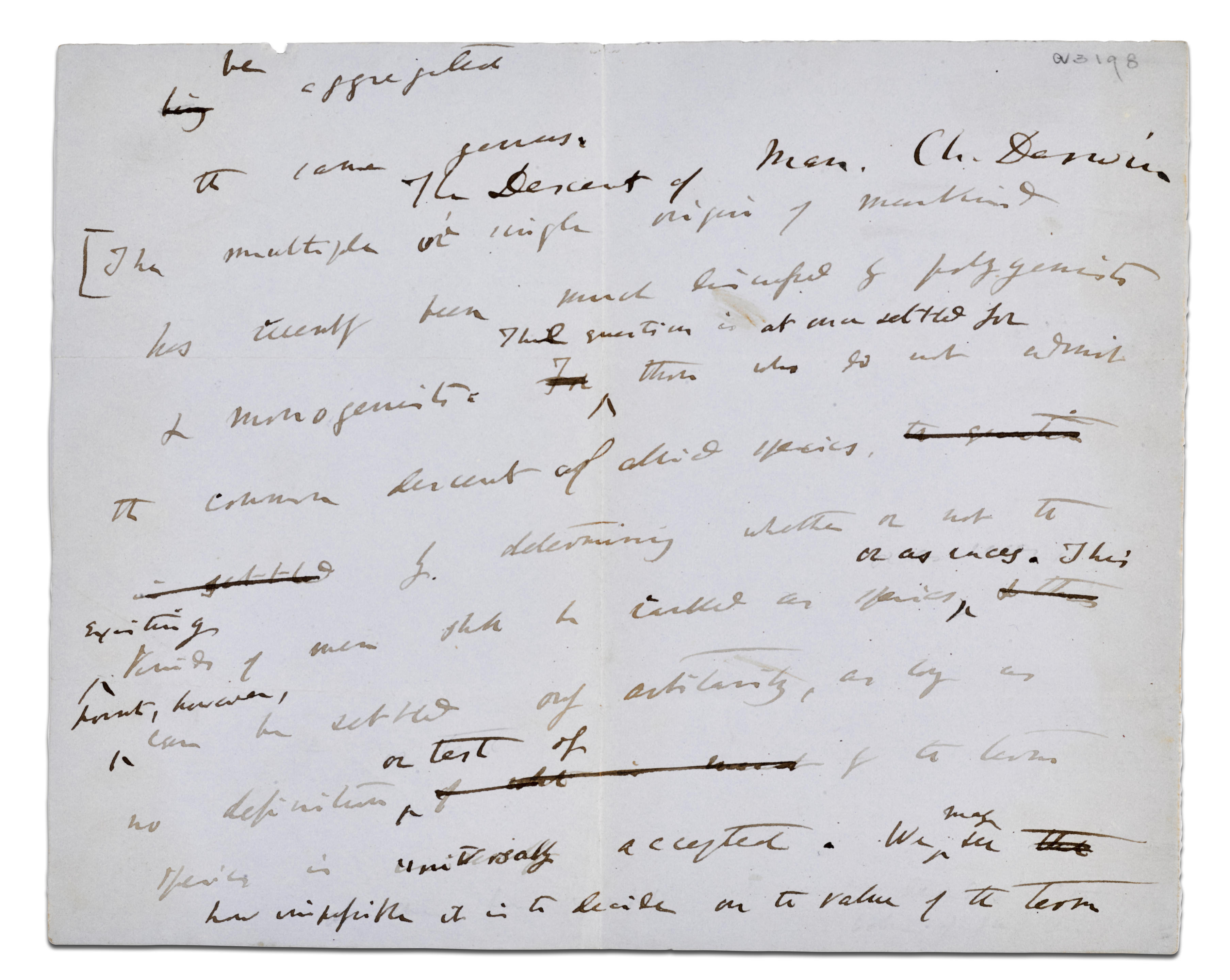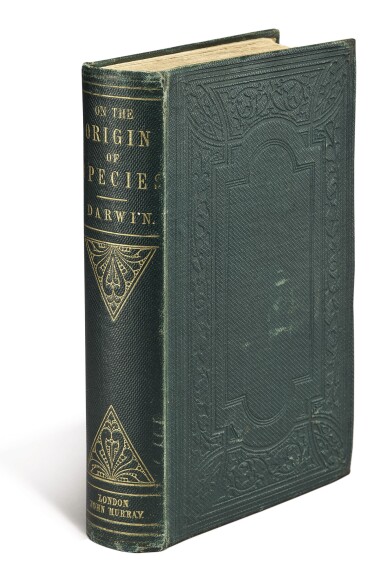DARWIN, CHARLES. 1809-1882. Autograph Letter Signed ("Ch Darwin") to Alexander Agassiz regarding gradation of structure in pediculariæ, in 4 pp, 8vo, on Down letterhead, August 28, [1871], folds. AN EXCELLENT UNPUBLISHED LETTER WITH DIRECT IMPACT ON HIS THEORY OF EVOLUTION, and citing new information incorporated into the 6th and final edition of Origin. In response to Alexander Agassiz, Darwin offers profuse thanks for information on pediculariae, the forcep-like organs found in Echinodermata: "It is a splendid case of gradation of structure. Over & over again I have come across some structures, & thought that here was an instance in which I shd. utterly fail to find any intermediate or graduated structure; but almost always by keeping a look out I have found more or less plain traces of the lines through which development has proceeded by short & easy & serviceable steps. Rarely, however, have I learnt so fine an instance as this of yours." The gradation of structure was instrumental to Darwin's theory of evolution, famously first observed in the finches of the Galapagos, and recorded in his Voyage of the Beagle (1839): "It is very remarkable that a nearly perfect gradation of structure in this one group can be traced in the form of the beak...." By the second edition of 1845, he had begun to articulate an evolution of species, "Seeing this gradation and diversity of structure in one small, intimately related group of birds, one might really fancy that from an original paucity of birds in this archipelago, one species had been taken and modified for different ends." Interestingly, Darwin had begun his scientific studies in the late 1820s with marine invertebrates, and spent 10 years between 1845 and 1854 consumed with an intensive study of cirripedes (barnacles), a period instrumental to the development of his theories. His enthusiastic interest in Agassiz's examples is palpable, and less than 6 months later, he had incorporated Agassiz's observations into the 6th edition of the Origin, a copy of which he sent to Agassiz in early 1872. He devotes four paragraphs (pp 191-193) to Agassiz's studies, ending apologetically, "I wish I had space here to give a fuller abstract of Mr. Agassiz's interesting observations on the development of the pedicellaria." A marine zoologist and the son of biologist and Darwin opponent Louis Agassiz, Alexander Agassiz was the author of many books, including Seaside Studies in Natural History, which Darwin thanks him for at the end of this letter, and which appears in Darwin's reading notebooks for 1871. A wonderful, unpublished, Darwin letter with fine scientific content having direct bearing on the Origin and the theory of evolution.
DARWIN, CHARLES. 1809-1882. Autograph Letter Signed ("Ch Darwin") to Alexander Agassiz regarding gradation of structure in pediculariæ, in 4 pp, 8vo, on Down letterhead, August 28, [1871], folds. AN EXCELLENT UNPUBLISHED LETTER WITH DIRECT IMPACT ON HIS THEORY OF EVOLUTION, and citing new information incorporated into the 6th and final edition of Origin. In response to Alexander Agassiz, Darwin offers profuse thanks for information on pediculariae, the forcep-like organs found in Echinodermata: "It is a splendid case of gradation of structure. Over & over again I have come across some structures, & thought that here was an instance in which I shd. utterly fail to find any intermediate or graduated structure; but almost always by keeping a look out I have found more or less plain traces of the lines through which development has proceeded by short & easy & serviceable steps. Rarely, however, have I learnt so fine an instance as this of yours." The gradation of structure was instrumental to Darwin's theory of evolution, famously first observed in the finches of the Galapagos, and recorded in his Voyage of the Beagle (1839): "It is very remarkable that a nearly perfect gradation of structure in this one group can be traced in the form of the beak...." By the second edition of 1845, he had begun to articulate an evolution of species, "Seeing this gradation and diversity of structure in one small, intimately related group of birds, one might really fancy that from an original paucity of birds in this archipelago, one species had been taken and modified for different ends." Interestingly, Darwin had begun his scientific studies in the late 1820s with marine invertebrates, and spent 10 years between 1845 and 1854 consumed with an intensive study of cirripedes (barnacles), a period instrumental to the development of his theories. His enthusiastic interest in Agassiz's examples is palpable, and less than 6 months later, he had incorporated Agassiz's observations into the 6th edition of the Origin, a copy of which he sent to Agassiz in early 1872. He devotes four paragraphs (pp 191-193) to Agassiz's studies, ending apologetically, "I wish I had space here to give a fuller abstract of Mr. Agassiz's interesting observations on the development of the pedicellaria." A marine zoologist and the son of biologist and Darwin opponent Louis Agassiz, Alexander Agassiz was the author of many books, including Seaside Studies in Natural History, which Darwin thanks him for at the end of this letter, and which appears in Darwin's reading notebooks for 1871. A wonderful, unpublished, Darwin letter with fine scientific content having direct bearing on the Origin and the theory of evolution.

.jpg)


.jpg)

.jpg)
.jpg)



.jpg)

.jpg)

Testen Sie LotSearch und seine Premium-Features 7 Tage - ohne Kosten!
Lassen Sie sich automatisch über neue Objekte in kommenden Auktionen benachrichtigen.
Suchauftrag anlegen